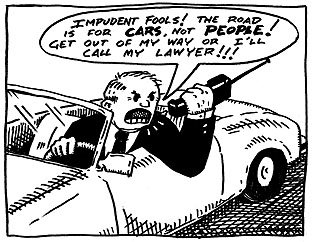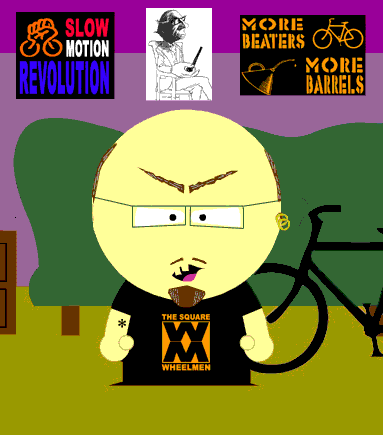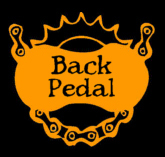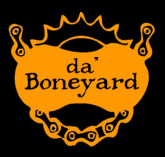Going nowhere...
 Critical Mass is a mobile space unlike those that are often meaningless precisely because they are stationary: streets, parking lots, and parks. Folks normally move through and along the spaces, rarely stopping to acknowledge their significance, and perhaps more importantly, their effect on them.
Critical Mass is a mobile space unlike those that are often meaningless precisely because they are stationary: streets, parking lots, and parks. Folks normally move through and along the spaces, rarely stopping to acknowledge their significance, and perhaps more importantly, their effect on them.Massers, on the other hand, move past and often through them giving each a new, if temporary, meaning. This in many regards is the essence of Critical Mass. It is a gathering point; a space between different places as well as between the bikers themselves that functions as the dynamic foundation for a mobile social network. The street, the parking lot, and park all become a zone that we know in a new way by connecting with them without having thee destination most find at the ends of the street.
has no itinerary
 This makes it both an implicit display and an explicit but assumed feature of the street. Although outsiders might rarely stop to acknowledge the formative influence of the street, the mass, as a product of a culture that occurs in the street, is significant and requires examination. In The City: An Urban Cosmology. (New York: State University of New York Press, 1999) J. Grange observes that the street functions primarily as a temporal location that incorporates fluid combinations of time:
This makes it both an implicit display and an explicit but assumed feature of the street. Although outsiders might rarely stop to acknowledge the formative influence of the street, the mass, as a product of a culture that occurs in the street, is significant and requires examination. In The City: An Urban Cosmology. (New York: State University of New York Press, 1999) J. Grange observes that the street functions primarily as a temporal location that incorporates fluid combinations of time:Time in the street is the continual collision of the past and the future with the present. There is no time to stop and recollect the past. It simply “comes by”. The future streams into the present with such immediacy that it could be said to implode into the present. (109)
is an ever shifting point
 It provides a location in movement and renewal in progress. It represents the simultaneous desire for a future but also a shedding of the past. The latter is the desire for an ever-shifting destination point. Unlike the street itself, which demands a return journey, here we have total involvement, an immediate connection, a mobile space where time is removed in search of no real end point – that immediately physical, but also very much conceptual end of the street – the destination point.
It provides a location in movement and renewal in progress. It represents the simultaneous desire for a future but also a shedding of the past. The latter is the desire for an ever-shifting destination point. Unlike the street itself, which demands a return journey, here we have total involvement, an immediate connection, a mobile space where time is removed in search of no real end point – that immediately physical, but also very much conceptual end of the street – the destination point.is instructive
 The mass is a zone of unconscious assumptions. As massers roll they reflect on it; thus the mass shapes bikers and enters their identity as a formative site of the urban experience. We find located in the street very specific and deliberate information markers, right up to the point where the street is the information marker as with the information superhighway. The street comes to be a site of knowledge and discourse, in constant interplay and renewal, presented to bikers as they roll through.
The mass is a zone of unconscious assumptions. As massers roll they reflect on it; thus the mass shapes bikers and enters their identity as a formative site of the urban experience. We find located in the street very specific and deliberate information markers, right up to the point where the street is the information marker as with the information superhighway. The street comes to be a site of knowledge and discourse, in constant interplay and renewal, presented to bikers as they roll through.The French Situationists, though writing in the 1960s about pedestrians, noted that for the Flaneur, that streetwalker and social critic of fin de siecle Paris, the street offered a key location for the play of the social that would become Critical Mass 30 years later.
The Flaneur lives his life as a succession of absolute beginnings. From the past, there is an easy exit; the present is just a gateway; the future is not yet, and what is not yet cannot bind. (Bauman 139)It is the flaneur that:
…is like a detective seeking clues who reads people’s characters not only from the physiognomy of their faces but via a social physiognomy of the street. (Shields 63)
 Massers, like flaneurs, read the street. From the detective like gathering of information on the street, they operate as a moving point on the temporal continuum of the street. It is the massers who stop to exert their reading, their observation of the streetscape in order to fix it in a point in time and space.
Massers, like flaneurs, read the street. From the detective like gathering of information on the street, they operate as a moving point on the temporal continuum of the street. It is the massers who stop to exert their reading, their observation of the streetscape in order to fix it in a point in time and space.This is to say that flaneurs are not dead, gone with the arcades of modern Paris. All massers, as street-users, are implicated in a flanerie of necessity in this period of late capital. We find ourselves exposed to a range of message systems in the streetscape – information networks that represent the global village in our very own local thoroughfares.
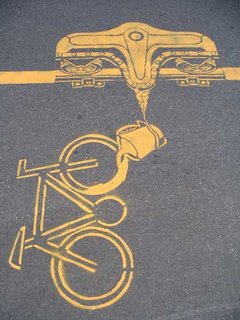 It is Critical Mass that exposes bikers, in their corner of the world to the multiple discourses of the urban environment. The mass is one of the few open locations away from comfort points in the home, shopping mall or school. A space that is inhabited, yet common, invested with multiple meanings and ownerships simultaneously.
It is Critical Mass that exposes bikers, in their corner of the world to the multiple discourses of the urban environment. The mass is one of the few open locations away from comfort points in the home, shopping mall or school. A space that is inhabited, yet common, invested with multiple meanings and ownerships simultaneously.We might see the mass functioning in terms of what Giroux labeled public pedagogies; those informal pedagogical practices that
…are not restricted to schools, blackboards, and test taking. … Such sites operate within a wide variety of social institutions and format including sports and entertainment media, cable television networks, churches and channels of elite and popular culture, such as advertising. Profound transformations have taken place in the public space. (Giroux 498)
is both host and horde
 It is an active host of public pedagogies (such as the roadside billboard, or traffic sign) and a pedagogical force of its own contextualisation. As urban flaneurs massers negotiate the streetscapes whilst being bombarded with information flows as public pedagogies, each drawing their own discursive formations and identity forming practices. In itself, the mass becomes a vibrant location of information flows, discursive practice – public pedagogies.
It is an active host of public pedagogies (such as the roadside billboard, or traffic sign) and a pedagogical force of its own contextualisation. As urban flaneurs massers negotiate the streetscapes whilst being bombarded with information flows as public pedagogies, each drawing their own discursive formations and identity forming practices. In itself, the mass becomes a vibrant location of information flows, discursive practice – public pedagogies. And it is this that incorporates massers as unwitting flaneurs. They absorb the flows and constructions of the mass and its streetscape and interact as individuals contextualised by the urban environment. They read their way through urban habitats with the mass creating a path to those key points of destination. Massers draw meaning as they pass through the streetscape and as it responds to them, washing over them with images and representations of the global, urban space.
And it is this that incorporates massers as unwitting flaneurs. They absorb the flows and constructions of the mass and its streetscape and interact as individuals contextualised by the urban environment. They read their way through urban habitats with the mass creating a path to those key points of destination. Massers draw meaning as they pass through the streetscape and as it responds to them, washing over them with images and representations of the global, urban space.
Critical Mass, as both a physical entity and imagined space, is implicit in the construction of meaning via this publicly instructive capacity. As such, it warrants more serious attention as a location of the construction of the social and location in which discursive formations find meaning and information flows present representations of our world.
Labels: critical mass, pensées, velotariat




































